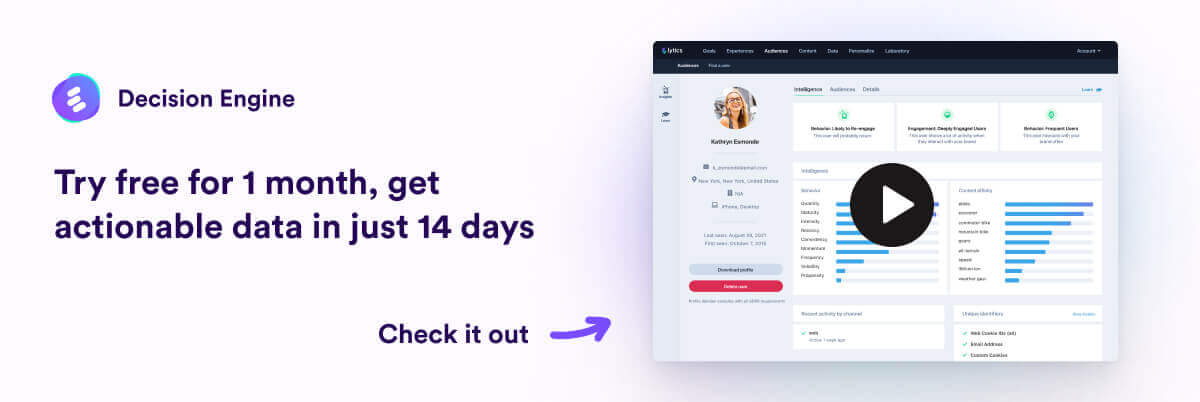4 Benefits of a composable customer data platform
June 10, 2022

A customer data platform is the crux of creating dynamic and highly personalized cross-channel customer platforms, allowing marketers to leverage actionable insights to understand customer behavior best. A CDP collects first-party customer data from several digital sources, including various customer transactions, online purchasing behavior, and demographic information such as customer names and addresses. CDPs focus on creating single, comprehensive views of every customer.
As digital transformation becomes more of a reality, CDP platforms are increasingly leading the transition, helping brands effectively use data to become more efficient and make strong data-driven decisions to create personalized customer experiences. In that digital transformation, business architectures will evolve, requiring CDPs to be more dynamic. As a result, more businesses are exploring composable customer data platforms, allowing brands to build around and leverage their data warehouses successfully. Here are the biggest benefits marketers and marketing-focused brands realize when using a composable CDP.
Improving tracking intelligence and speed
Traditional customer data platforms, while still effective, create unnecessary complexity that causes marketers and their brands to exhaust too many resources. Though they are built to create single-user profiles to improve data collection and management, customer data often gets replicated, creating excess copies, and making it harder to track customer data.
Composable customer data platforms eradicate data replication while offering real-time customer tracking intelligence to access actionable customer insights. Among these insights are product recommendations, focusing primarily on customer scoring and real-time personalization.
Furthermore, by leveraging composability into customer data platforms, businesses accelerate speed through discovery by allowing marketers to find customers through direct queries within a segmented process.
Adding creativity to data management
When composable technologies are integrated into customer data platforms, brands add some much-needed creativity to data management. Businesses can successfully leverage customer data in bite-sized chunks without comprehensive data mining.
Data managers and developers can develop a 360 system within a secure and compliant data warehouse, collecting and unifying customer data to create 360 profile schemas that are exported to a customer data warehouse, ensuring a persistent system for all customers.
Furthermore, data analysts and managers establish customer segmentation with SQL query editors directly on customer data warehouses. Additionally, cloud technology allows for synchronizing various marketing channels and tools to develop highly targeted advertising campaigns.
Increasing the flexibility of business architectures
Composable customer data platforms optimize business architectures to keep pace with ever-evolving technological demands, making them more resilient and flexible. By optimizing these architectures, businesses can improve their pivoting and matchup with customers’ constantly changing demands in the digital age.
A composable CDP offers a more modular approach to creating a versatile customer data architecture that effortlessly fits existing business workflows and tech stacks. Composable platforms use customer data warehouses to build and store the CDP for activation at any time. With reverse ETL capability integrated into its system, a composable CDP connects directly to in-house data warehouses to facilitate fully private activation. By reducing risk and optimizing customer data management, business infrastructures have the versatility to allow marketing professionals to deliver personalized experiences to customers.
By focusing on a single customer data model, business architectures get much-needed scalability while allowing for more action to be taken on customer insights to deliver personalization consistently.
Offering much-needed scalability
Composable customer data platforms allow marketers to deliver personalization to clients at scale while gaining real-time intelligence. Composable technologies offer real-time scoring capabilities to create additional attributes and insights. The added scalability comes when the necessity to create a C360 increases as we enter a cookieless world, needing to access first-party data to engage customers and platforms actively.
Traditional customer data platforms, by comparison, require the sending of customer data to separate data stores for processing and unification. As a result, companies struggle to scale their architecture, causing activation to erode and requiring significant upfront effort to get data housed within a proprietary system. A Composable CDP only needs one data store and eradicates complexity when managing customer data.
Lytics is a customer data platform that ensures you provide the hyper-personalization that your customers demand, relying on data-driven insights to help you improve your business performance. Check out our wide range of products and reach out to us today so we can help you grow your business organically.



